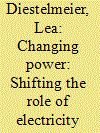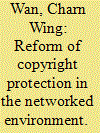| Srl | Item |
| 1 |
ID:
166433


|
|
|
|
|
| Summary/Abstract |
One of the pressing legal questions of the energy transition is how to integrate “prosumers”, consumers who start producing electricity, in the electricity market. So far, their influence remains limited or fully absent because their role as independent market participants is barely or not facilitated as they are usually subject to regulated remuneration schemes. Blockchain technology offers changing the approach of “integration in the market” into “becoming the market” by enabling peer-to-peer transactions. Currently, transactions are facilitated by third parties, suppliers and system operators, whose main task is centrally compiling and coordinating information on loads and generation and contracting supply and distribution services. Instead, blockchain technology enables new ways of organising decentralised persons without the immediate need for one centrally connecting entity. This implies profound legal- and policy consequences. Based on information on first use cases of blockchain applications in the electricity sector, this article identifies those main policy implications for EU electricity law and thereby adds to the discussion how blockchain technology could facilitate “prosumers” to develop as independent market participants in the electricity sector from an energy law perspective.
|
|
|
|
|
|
|
|
|
|
|
|
|
|
|
|
| 2 |
ID:
085866


|
|
|
|
|
| Publication |
2008.
|
| Summary/Abstract |
On 15 April 2008, the Hong Kong government released its preliminary proposals on Copyright Protection in the Digital Environment, which cover the civil and criminal liabilities of online infringers and the role of online service providers (OSPs) in combating internet piracy. The preliminary proposals favor OSPs and users more than copyright owners. The government proposes that the OSPs, the content industries and users should voluntarily create a code of practice which defines the role and scope of OSPs in the fight against online piracy. The OSPs oppose any rules making them liable for copyright infringement and the safe harbor provisions. The content industries, in contrast, insist that, in line with international norms, both OSP liability and safe harbor provisions be written into the code of practice. I argue that, in the absence of any assignment of legal right to any party, the Coase theorem predicts that negotiations will fail. The key issue is which party should bear the transaction costs of copyright enforcement, because there are millions of online infringers; however, if the transaction costs of enforcing copyright in the networked environment are prohibitively high, the credibility of the copyright system will be undermined and online piracy will become commonplace.
|
|
|
|
|
|
|
|
|
|
|
|
|
|
|
|